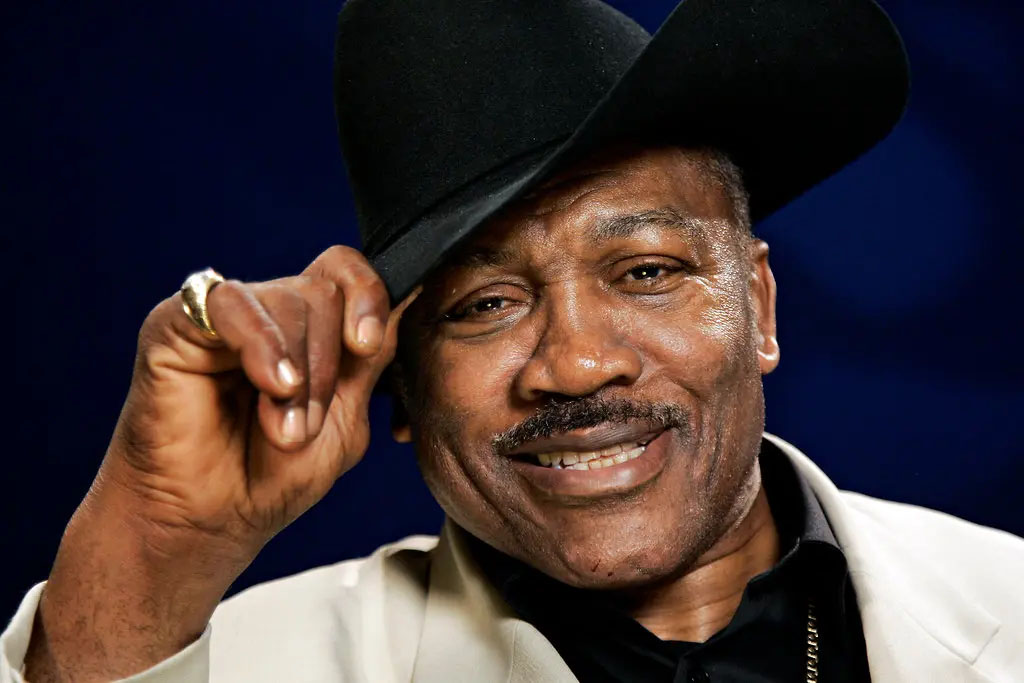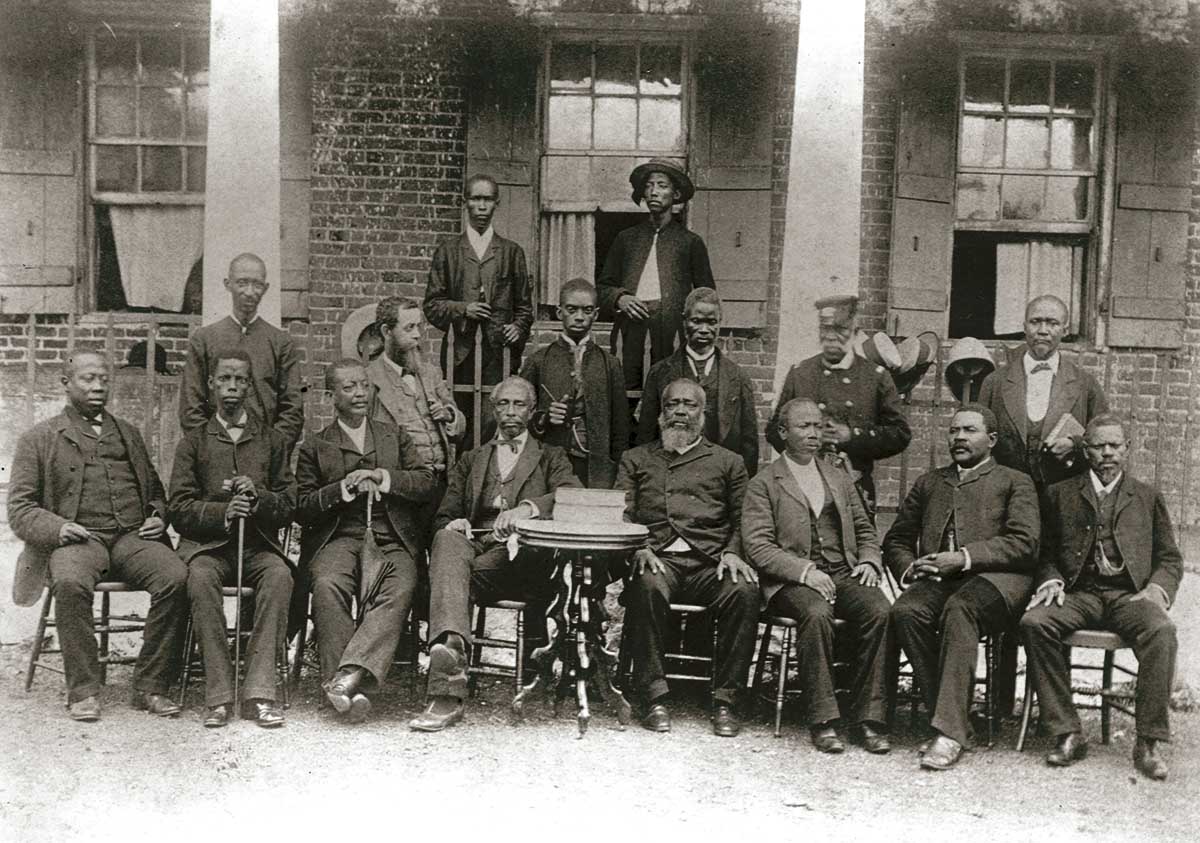The six Black members of President Joe Biden’s Cabinet on Thursday celebrated Black History Month by discussing their roles, some of which are historic firsts.
Black History
Black members of Biden’s Cabinet mark Black History Month

- From Threats to Partnership: How Diplomacy Repositioned Nigeria in Washington - January 13, 2026
- Burbank Marriage Unravels After Woman Allegedly Used Tracking Devices to Monitor Husband - December 27, 2025
- U.S. Signals More Strikes in Nigeria as Abuja Confirms Joint Military Campaign - December 27, 2025
Black History
Bernice King’s Redemption Bank is now the first Black-owned in the West

In 2023, a group of Black investors based in Atlanta agreed to buy a white-owned bank, Holladay Bank & Trust, and convert it into a Black-owned one. The investors included Dr. Bernice A. King, a daughter of civil rights icon Dr. Martin Luther King Jr; Ashley D. Bell, a former White House policy adviser, and former NFL player Dhani Jones.
They planned to rename the Utah-based institution Redemption Bank and said they wanted to provide financial services to Black communities historically underserved by financial institutions while offering online banking services and small business loans.
The deal, which was awaiting regulatory approval, would mark the first time Black investors purchased a non-Black bank, a statement by Redemption Holding Company said at the time. It would also be the first time in American history that an existing commercial bank would become a Black-owned Minority Depository Institution (“MDI”) through acquisition, the statement added.
After two years, Redemption has finally completed its acquisition of Holladay Bank & Trust. It makes it the first time a bank has been owned by a Black-led investment group in the Western U.S., the AP reported this month.
The acquisition got delayed due to the collapse of Silicon Valley Bank in 2023, Bell, CEO and chairman of Redemption Holding, told the AP.
“This process has undoubtedly taken longer than any of us anticipated,” Bell said. “However, we are grateful for the diligence of the staff at the FDIC, the leadership of the (American Bankers Association), and the renewed sense of urgency from the new administration this year, all of which helped bring everything together.”
While Bell is the CEO, King is expected to be Redemption Bank’s senior vice president for corporate strategy and serve on the company’s advisory board.
With about $65 million in assets, Redemption Bank will be the first Black-owned bank not physically located within an economically vulnerable community and the first in the Rockies, according to the AP.
It will also be the only one located in the Black-banking desert that stretches from Houston to Los Angeles, the AP added.
The company will further become the 24th Black-owned bank in the nation, termed as Minority Depository Institutions (MDI). MDI is a federal designation for banks and unions that are owned or controlled by minority groups. The most recent MDI was Adelphi Bank, launched in January 2023.
- From Threats to Partnership: How Diplomacy Repositioned Nigeria in Washington - January 13, 2026
- Burbank Marriage Unravels After Woman Allegedly Used Tracking Devices to Monitor Husband - December 27, 2025
- U.S. Signals More Strikes in Nigeria as Abuja Confirms Joint Military Campaign - December 27, 2025
Black History
Texas Southern Great, NFL Player Charley Frazier Dies at 83

Texas Southern University’s track & field and professional football great Charlie Frazier passed at 83. Frazier was a native of Angleton, Texas, and starred in track star with fellow TSU great Homer Jones.
Frazier ran a 9.4 sec. 100-yard dash and 20.8 sec. 220-yard sprint at Texas Southern. The speedster teamed with Homer Jones, Barney Allen, and Lester Milburn to win the sprint medley (3:22.4), quarter-mile (41.2), and half-mile (124.4) relays at the Drake Relays in 1961.


He was incredibly fast. Frazier went undrafted in 1962 but earned a roster spot with his hometown Houston Oilers, where he played until 1968. In 1966, he caught 12 touchdowns and over 1,200 receiving yards and was voted to the 1966 AFL All-Star team. Frazier left Houston to compete with the American Football League’s Boston Patriots (now New England) from 1969-70.
Charlie Frazier coached at Houston’s John Reagan High School and college sports at Rice, Tulsa, and Texas Christian universities.
He retired from professional football with 3,452 receiving yards, 207 receptions, and 29 touchdowns.
Culled from the Texas Southern Athletics
- From Threats to Partnership: How Diplomacy Repositioned Nigeria in Washington - January 13, 2026
- Burbank Marriage Unravels After Woman Allegedly Used Tracking Devices to Monitor Husband - December 27, 2025
- U.S. Signals More Strikes in Nigeria as Abuja Confirms Joint Military Campaign - December 27, 2025
Africa
How thousands of freed Black Americans were relocated to West Africa

In the 1800s, the American Colonization Society relocated thousands of freed Black Americans to West Africa. It led to the creation of Liberia.
- The American Colonization Society’s mission was to relocate freed Black Americans to Africa.
- Starting in 1820, thousands of Black emigrants were shipped to what would become Liberia.
- The society’s segregationist ideology has a lasting impact on America and Liberia.
On December 21, 1816, a group of fifty white elites gathered in a Washington, D.C. hotel to discuss the future of freed Black Americans.
Following the American Revolution, the number of freed Black Americans had grown from 60,000 in 1790 to 300,000 by 1830. The American Colonization Society emerged as the solution, with the mission of shipping Black people to a colony in Africa.

African Americans depart for Liberia, 1896. The American Colonization Society sent its last emigrants to Liberia in 1904.Digital Collections, The New York Public Library
The organization was the brainchild of the Reverend Robert Finley, a Presbyterian minister from New Jersey. The ACS’ early supporters included some of the nation’s most powerful and influential men, including Henry Clay, Daniel Webster, and Francis Scott Key, as well as slave-owning US presidents Thomas Jefferson, James Monroe, and James Madison.
“Can there be a nobler cause than that which, while it proposes to rid our country of a useless and pernicious, if not a dangerous portion of our population, contemplates the spreading of the arts of civilized life?” Clay said in his opening address.

Membership certificate of Rev. Samuel Rose Ely, dated March 1840. The Society’s president Henry Clay’s signature is visible at the bottom right.Library of Virginia
Colonization, the state-sponsored emigration and resettlement of freed Black Americans outside America, was widely supported in the US for religious, economic, and social reasons. Even after its dissolution in 1964, the ACS has left a lasting legacy of segregationist sentiment in both America and abroad, according to historians.
“The establishment of the American Colonization Society was a watershed moment in American history,” Eric Burin, a history professor at the University of North Dakota, said. “What you have is a powerful white organization propounding a vision of America as a white person’s country, and African Americans responding with a resounding rebuttal that it’s their country, too.”
A ‘miserable mockery’
The ACS attracted a diverse crowd of white individuals, including slaveholders who saw colonization as a way to remove freed Blacks, whom they feared would cause chaos by helping their slaves escape or rebel.
Many white Americans also believed that African Americans were inferior, and should be relocated to a place where they could live in peace away from the shackles of slavery. Abraham Lincoln held this belief, which led him to support a plan to relocate 5,000 Black Americans to the Caribbean in the 1860s.
The ACS also had a religious mission of Christianizing Africa to “civilize” the continent, according to historian Marc Leepson.
The initial reactions of the Black American community and abolitionists were nuanced. Some activists, like James Fortein, immediately rejected the ACS, writing in 1817 that “we have no wish to separate from our present homes for any purpose whatever”.
But some other Black abolitionists were cautiously interested in the notion of an emigration program. Martin Delany, who was dismissed from Harvard Medical School after white students petitioned against the inclusion of Black students, claimed that even abolitionists would never accept Black Americans as equals, and so the solution lay in the emigration of all Black Americans.
“We are a nation within a nation,” Delany wrote. “We must go from among our oppressors.”
But even Delany ultimately condemned the ACS’s hallmark plan to send Black Americans to Liberia, decrying it as a “miserable mockery” of an independent republic.
It led to the creation of Liberia
As the ACS grew, it sought to create a colony in West Africa. On February 6, 1820, 86 freed Black Americans set sail to the continent.

An 1850 map of Liberia. Pencil annotations were made to change the report to “by the American Colonization Society,” and to add place names.American Colonization Society/Library of Congress
The initial expedition — and the expeditions that followed — proved to be disastrous as disease and famine struck. Of the more than 4,500 emigrants who arrived in Liberia between 1820 and 1843, only 40% were alive by 1843.
But the ACS, backed by funding from state and federal governments, continued to send more freed Blacks. In 1821, the society purchased Cape Mesurado from the indigenous people — by threatening the use of force, according to some accounts.
The land surrounding Cape Montserrado would later be known as Liberia, “the free land.” Its capital was renamed Monrovia in honor of James Monroe, an ardent supporter of the ACS.
The settlers developed an Americo-Liberian society that was strongly influenced by their roots in the American South, according to Burin. Americo-Liberians wielded vast socioeconomic and political power over the indigenous people — which planted the seeds for the Liberian Civil War of 1989.
“The Americo-Liberians realized they could essentially exploit the indigenous people for labor,” Burin told Insider. But it was a way for indigenous people to gain access to resources and education as well.
A lasting legacy of segregationist sentiment
Though the ACS eventually dissolved in 1964 after continuous opposition from abolitionists and a lack of interest by free Black Americans, historians said it shaped — and continues to shape — the country’s discussions of race.
“One of the ACS’ lasting legacies was the underlying ideology that drove the colonization movement forward: that Black people really aren’t Americans, at least not in the way that white people are,” Burin said.
The sentiment manifested itself in policies like Jim Crow-era segregation, and still has a grip on some Americans to this day.

A photo of children in Liberia, taken during an ACS mission trip in 1900.American Colonization Society Collection/Library of Congress via Getty Images
The second legacy of the ACS is Liberia itself. In 1847, Liberians declared the country an independent nation, becoming the second Black republic in the Atlantic after Haiti.
“The ACS founded a country that has had a distinctive influence over debates of freedom, slavery, and race today,” Burin said.
♦ Culled from the Insider
- From Threats to Partnership: How Diplomacy Repositioned Nigeria in Washington - January 13, 2026
- Burbank Marriage Unravels After Woman Allegedly Used Tracking Devices to Monitor Husband - December 27, 2025
- U.S. Signals More Strikes in Nigeria as Abuja Confirms Joint Military Campaign - December 27, 2025



















